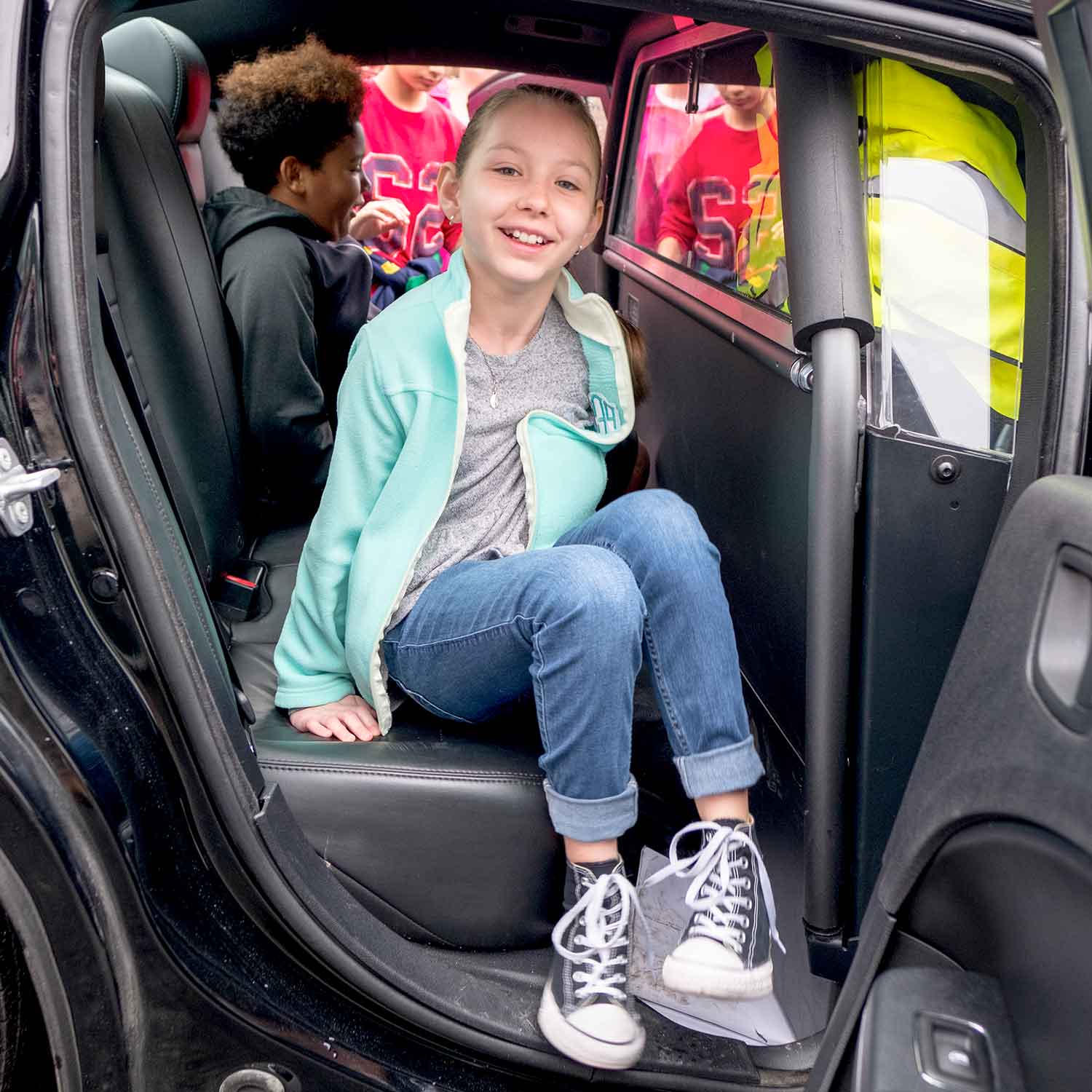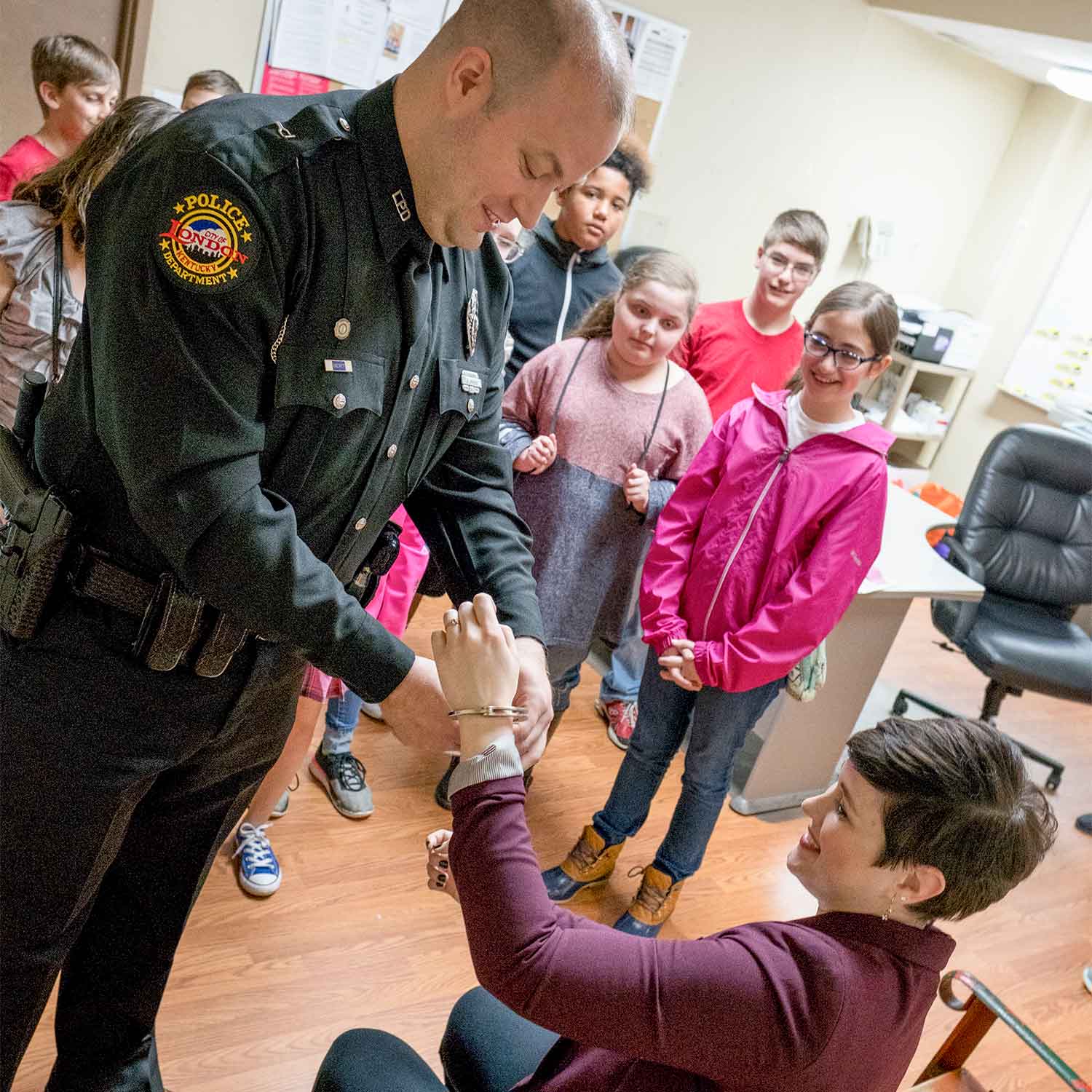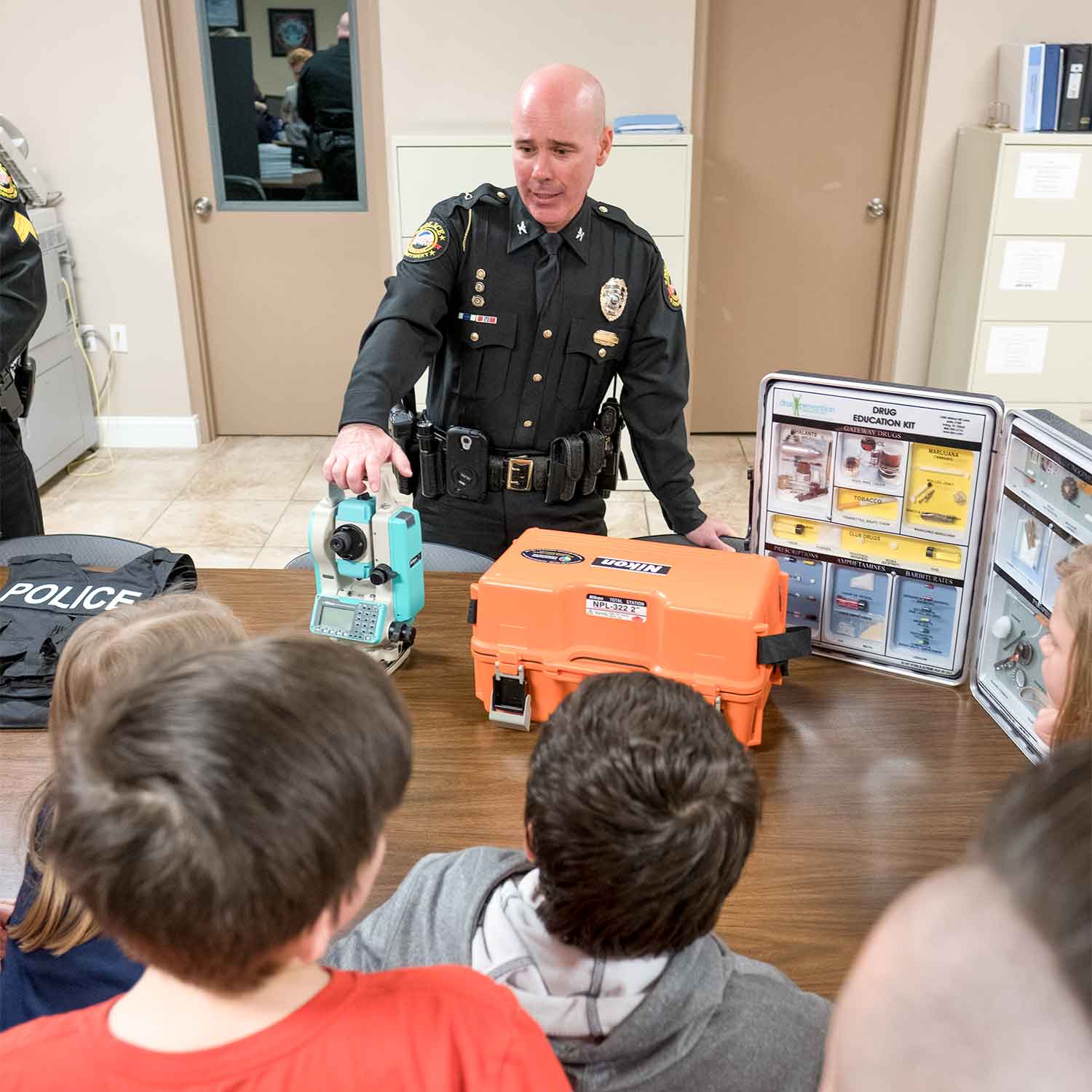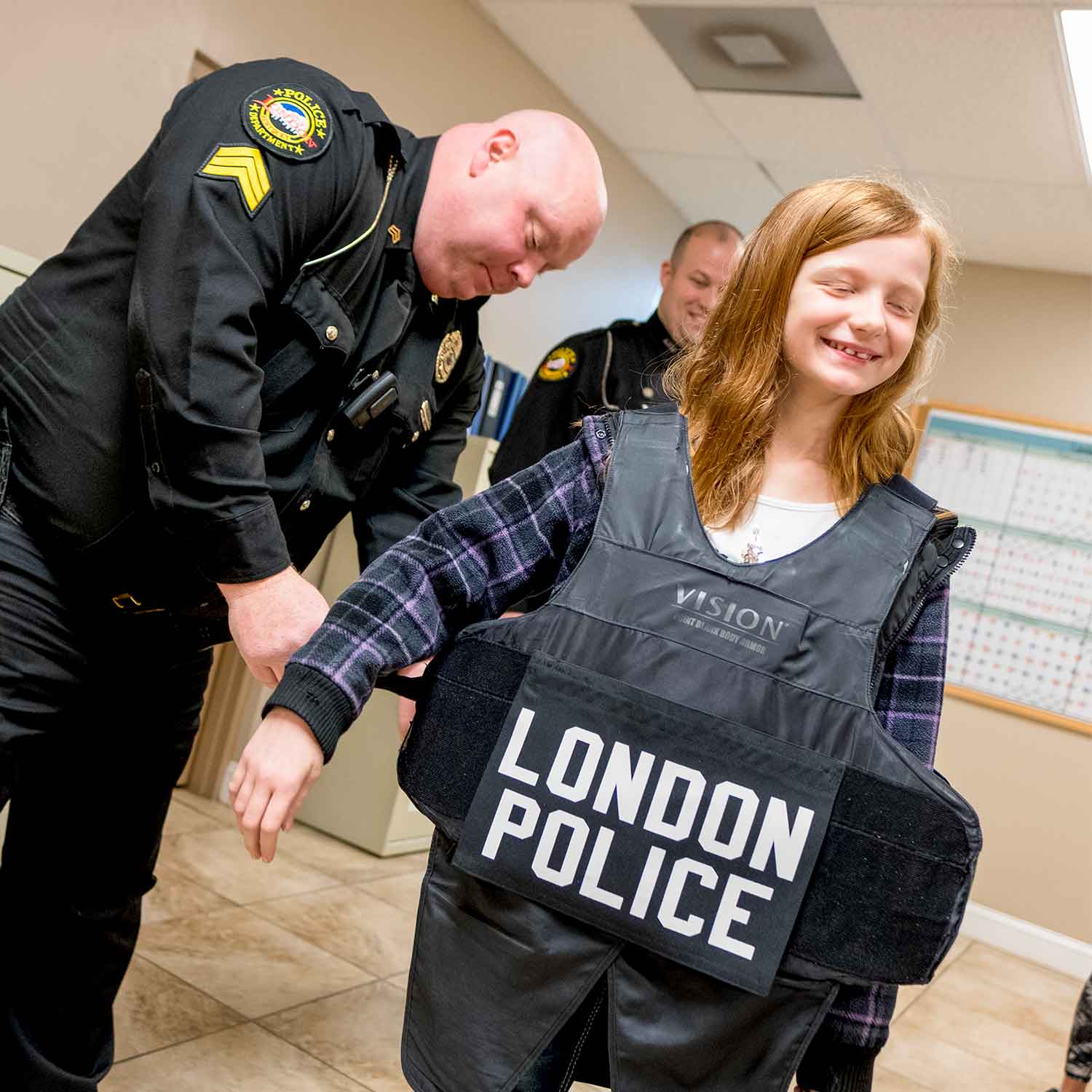London Police Department
Using the Community-Oriented Policing Approach
London Police Chief Derek House has a saying.
“If you invest in the community, then the community will invest in you.”
That saying goes hand-in-hand with the London Police Department’s commitment to its community-oriented policing philosophy.
“We’ve been in community-oriented policing since I was hired in 1995,” the chief said. “That’s the way I was hired. Bill Clinton was president, and he began the [Community-Oriented Policing Services] program where they hired police officers only, and Chief Elijah Hollon began the COPS program here in London, and we’ve always been involved in those types of programs – the drop and locks, where we walk around the low-income housing areas, walking up and down Main Street, talking to the business owners is a big part of it. So we’ve always been involved in it.”
In the post 9/11 world, House said the focus shifted in the wake of the terrorists attacks.
“We became more involved in the Homeland Security aspect of it, and we kind of got away from it,” House said. “But in 2014, when I became chief, it became a big thing that we wanted to get back involved in.”
London Police Chief Derek House (Photo by Jim Robertson)
To that end, the London Police Department’s 36 sworn officers began putting more of an emphasis on programs such as Neighborhood Watch, Coffee With a Cop and the Rape Aggression Defense program.
House said the results have been positive.
“We now are seeing the community becoming more involved in the police department,” he said. “That was one of the things we wanted to sell to the community.”
Since the concerted effort on community-oriented policing, House said the relationship between residents and police officers has reached new heights.
A big aspect of the improved relations has been the addition of the department’s community-service section.
“I picked three officers; I got Kenny (Jones), Travis (Hurley) and I brought Magen (Zawko) in,” House said. “I told them I want ideas of what we could do to invest in the community.”
Like many agencies, London’s partnerships with federal agencies has opened the door to federal dollars from adjudicated drug cases, and much of those funds help the different community-oriented programs the police department offers.
"I have taskforce officers assigned to Appalachia HIDTA (High Intensity Drug Trafficking Area),” House said. “Many of our drug investigations are prosecuted federally. Being partnered with HIDTA assists us in getting federal dollars, which makes it possible for us to provide additional community-education programs.”
Many of the ideas the three brought to the table were simple, such as reading to children at the Laurel County Public Library and the 11 area elementary and private schools in the county and offering identity-theft talks with senior citizens to make them aware of the various scams circulating.
Tourism Presents Challenges
London – located some 40 miles north of the Tennessee line off I-75 – is a tourism destination for many people. According to House, two-thirds of the year, tourism-related activities occur, requiring the London Police Department to employ special details for coverage.
“There are 52 weeks in the year and we will run 35 special events in that 52-week period,” House said. “We have everything from the World Chicken Festival to car shows.”
Without a doubt, the largest event of the year is the World Chicken Festival, a four-day event held annually the fourth week of September which draws tens of thousands of people every year to London.
“When the Chicken Festival is going on, we have officers working 16-hour days,” House said. “Every officer here is working; there is no vacation during that week.”
Last year’s Chicken Festival was highlighted by a free Brett Michaels (lead singer of the 1980s rock group Poison) concert, which presented a unique challenge for London officers.
“During the Brett Michaels concert, we had more than 20,000 people in a one-block area,” House said. “We covered that event with 13 police officers and 10 National Guard members, and we had zero problems. I was so proud of those guys that night.”
Lt. Matthew Moore agreed with House, saying active tourism makes London a unique place to police.
“We get to see a lot of people from out of state,” Moore said. “People come in and out all the time. We’re just like any other town, it’s just where we’re located and all of the tourism attractions around here that bring in so many more people.”
Moore said in many ways, London is a destination for residents in other eastern-Kentucky communities.
“There’s a lot of small towns in eastern Kentucky that just don’t have the tourism attractions we have,” he said. “For them, it’s a whole different world. I run into people from eastern Kentucky, and they look at us like we would look at Lexington. They’re like, ‘Wow, you guys have everything.’ We’re like, ‘Really?’”
Major Roadways
Interstate 75, the Hal Rodgers Parkway, U.S. 25 and Ky. 192 are four heavily-traveled roadways that run through the heart of London. These major roadways present all kinds of challenges from a high number of accidents to the scourge of drugs passing through the area.
“It’s a multi-lane interstate, and it seems like everything comes through London,” House said, referring to I-75. “We’re right at the intersection of these major roadways, and so the traffic is intense and major accidents are inevitable.”
As expected, the major roadways, especially the Hal Rogers Parkway and I-75, have netted countless drug-related arrests for LPD officers.
“I have one officer here – we work 12-hour shifts now – so his work week this week (last week of March) was three days. In that time, he arrested 12 people on varying charges. The biggest part of those people were arrested off those roadways. We do work with the Kentucky State Police, and on the Hal Rogers we have a lot of work there with drug-related activities.”
Photo by Jim Robertson
Non-sworn PIO
A unique facet of the London Police Department is a civilian position dedicated to public information. Magen Zawko was hired by the department in 2015 based on an overwhelming need, House said.
“We had an officer who was doing an excellent job at it, and we had a Facebook page and website, but it was so hard to keep that up, and it was being bombarded with media requests and at the same time I was implementing the body-camera policy,” he said. “I approached the mayor to bring somebody in and we had a clerical position that was open. We created a hybrid position and brought her in because of her abilities.”
Prior to working for the police department, Zawko worked for the London newspaper and performed a similar public information/community relations role with the Laurel County Public Library.
Zawko said she views the position as a bridge of sorts with the community.
“We are a family here at the London Police Department, and I see the officers' mission to protect and serve day in and day out,” Zawko said. “I also work outside of the office with the community and see their needs and/or concerns. A PIO is vital to every community to bridge the gap in building relationships and sharing education.”
Zawko, who holds a degree in news/editorial journalism from Western Kentucky University, also deals with media requests and the department’s social-media accounts.
“Since I came on board in August 2015, I believe our officers’ understanding of media has improved and the way we work with the media has improved,” Zawko said. “We have more social-media presence and consistent dialogue with our news media.”
Combating Drugs
Like many departments, the battle against drug abuse is an everyday, seemingly never-ending fight.
“I think it’s everywhere in Kentucky; it’s terrifying,” House said. “Locking them up is not working. We’ve been working with the Laurel County [Agency for Substance Abuse Policy] program, hospitals and mental-health facilities, trying to work out some type of treatment program.”
House said that unless a person is at their absolute bottom, it’s nearly impossible to help them.
“They will ask for help,” he said. “They don’t need that help in a week, they don’t need it tomorrow; they need it right then because that’s when they’re willing to get it. We’re trying to work with these other agencies to come up with the ability to get those people help when they need it and not just take somebody who has a minor charge down there and throw them in jail. That only solves that problem for one night; you’re not solving the problem.”
Last year, London officers started carrying Naloxone kits, and House said they have been used far too often.
“We’re seeing a lot of crystal methamphetamine and a prescription-drug problem,” House said. “The Naloxone kits – we’ve been carrying those for more than a year now, and we’ve had multiple uses. We used one in the school recently. We’ve had multiple uses, and we [received] our second round of kits in April.”
All in all, London’s efforts in community-oriented policing are paying off and keeping officers busy.
“The activity is very high for the officers,” House said. “We have a good combination of youth and age with our officers. We work 12-hour shifts and I think our officers are really active.”













